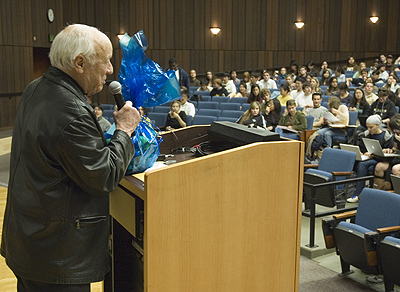Berkeleyan
 |
Leon Litwack addressed his History 7B class after accepting the Golden Apple Award for Outstanding Teaching (note the gift-wrapped basket of apples). (Steve McConnell photo) |
Litwack: 'These are the awards that really matter'
Retiring historian, a favorite of students for years for his 'contagious enthusiasm,' wins their Golden Apple Award
![]()
| 04 April 2007
It was another standing ovation for Professor Leon Litwack in his History 7B class.
Such shows of appreciation for the social historian and iconoclast are reaching a fever pitch in the final countdown to Litwack's retirement at the semester's end. In his half-century of teaching more than 30,000 students about America's checkered racial history, the Pulitzer Prize-winning author has won fans of all ages and persuasions.
But the applause on March 21 was particularly poignant. Surprising Litwack and his several hundred students in Wheeler Auditorium, a group of student leaders on campus interrupted the class to announce that the 77-year-old history professor had won the 2007 Golden Apple Award for Outstanding Teaching. The annual award is given to a faculty member by a committee of Berkeley students.
"These are the awards that really matter," Litwack said, beaming as he was presented with a basket of golden delicious and Fuji apples. "My students have been wonderful, and that's what makes teaching exciting."
But Litwack was not about to draw out his tribute. He had a lecture to get on with, and the Golden Apple announcement, though more than welcome, was holding up his multimedia presentation on America in the 1930s.
"This is very meaningful," Litwack said, gratefully, before he signaled for the movie to start rolling.
The student-driven honor comes with $2,500 in prize money, plus confirmation that students dig the winner's thought-provoking teaching style.
"He's cool," said freshman Kaeley Loskutoff as she waited for Litwack's lesson to begin. "I feel lucky to be taking his last class."
Litwack was chosen from among 54 student-nominated faculty members by the all-student Golden Apple Award Committee. The panel narrowed the pool down to five finalists, picking the winner based on lecturing, approachability, and a passion for teaching.
Students who voted for Litwack find his themes and oratory style riveting.
"I can hardly find a moment to blink, for fear I'll miss something interesting," wrote David Rosenberg, a sophomore, in his nomination of Litwack. "He is the only professor who receives a round of applause after every lecture."
'Becoming a historian'
As part of the honor, Litwack will deliver a special Golden Apple Lecture on Tuesday, April 17, at 6:30 p.m. in Wheeler Auditorium. The event is free for students and faculty. A week later (Tuesday, April 24), Litwack will give his final campus address, an autobiographical talk entitled "I'm Becoming a Historian." That campus location is yet to be announced.
Later in April, the campus will announce the recipients of its Distinguished Teaching Awards for 2007, Berkeley's highest honor for instruction.
This is the third Golden Apple Award on campus. It is sponsored by the ASUC, the California Alumni Association, Cal Perform-ances, Berkeley Hillel, and the Cal Student Store. Last year's winner was senior neurobiology lecturer David Presti, and the 2005 winner was political-science lecturer Darren Zook.
"It's the only official teaching award conferred exclusively by the students," says Sammy Averbach, an ASUC senator and chair of the Golden Apple Award Committee. "The award recognizes those professors who teach each lecture as if it were their last."
Born to poor Ukrainian immigrants in Santa Barbara in 1929, Litwack developed a fascination for African American history in high school. He went on to earn his bachelor's, master's and Ph.D. degrees from Berkeley, where he continued to focus on the consequences of slavery, including segregation.
After seven years teaching at the University of Wisconsin, Madison, Litwack returned to Berkeley to join the history department in 1964, and became active in civil rights and the Free Speech Movement.
He went on to win numerous awards, including the Pulitzer Prize in 1980 for his book, Been in the Storm So Long: The Aftermath of Slavery (Knopf, 1979). At the time that the prize was announced, he was in Moscow working as a Fulbright lecturer.
In a Berkeley commencement address delivered in 1981, Litwack looked back on the activism of the 1960s and asked students to continue to challenge authority, particularly in light of Ronald Reagan's presidency.
"It is not the dedicated revolutionaries, it is not the rebels who endanger society, but rather the accepting, the unthinking, the unquestioning, the docile, the obedient, the indifferent," he said.
In the 1990s, Litwack was a vocal opponent of the ban on affirmative action in University of California admissions, arguing that diversity makes Berkeley a richer place for everyone on campus.
In 2001 he was chosen by Berkeley seniors to give the faculty address at Commencement Convocation, an event for all graduates. His rousing message was not unlike the one he gave the graduating class of 1981.
"The receptivity to alien, untried ideas defines the greatness of a university. Those [who] are unthinking, unquestioning, or indifferent are the biggest threat to our society," he said.
Despite his prestige and seniority, Litwack has insisted on teaching introductory history courses to challenge undergraduates to think critically and come up with their own analysis of the past.
"Teaching is more than imparting information. It is a process by which we seek to stir and challenge the intellect," wrote Michael Tsiang, a sophomore majoring in chemical engineering, quoting Litwack on his teaching philosophy, in his nomination.
Freshman Jared Mazzanti summed up Litwack's style more succinctly after the Golden Apple Award announcement: "His passion is contagious," he said.

